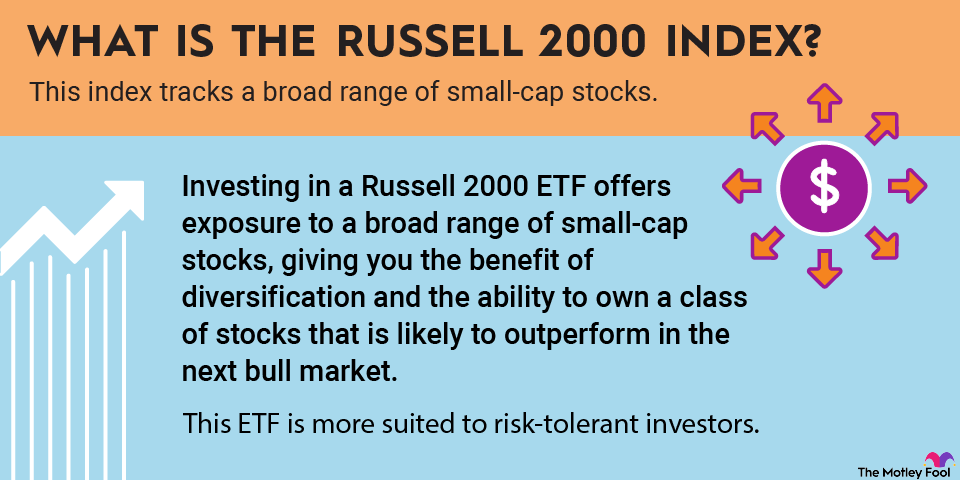There are a number of reasons an investor would want to own a Russell 2000 ETF. The Russell 2000 index tracks a broad range of small-cap stocks, so if you want exposure to hundreds of small-cap stocks, the easiest way is with a Russell 2000 ETF.

The underlying index tends to be more volatile than other stock market indexes, such as the S&P 500, which tracks large-cap stocks. So, a Russell 2000 ETF is better suited to investors with a high risk tolerance. But with interest rates currently coming down, now could be an opportune moment to buy a Russell 2000 ETF since the index tends to do well when interest rates are falling.
In the article below, we'll discuss the key components of the best exchange-traded funds (ETFs) that track the benchmark Russell 2000, including their assets under management, expense ratios, investment results, unique aspects, and other attributes.
Exchange-Traded Fund (ETF)
Top 5 Russell 2000 ETFs
Name | Issuer | Assets Under Management | Expense Ratio |
|---|---|---|---|
iShares Russell 2000 ETF (NYSEMKT:IWM) | BlackRock | $71 billion | 0.19% |
Vanguard Russell 2000 ETF (NASDAQ:VTWO) | Vanguard | $13.6 billion | 0.07% |
Vanguard Russell 2000 Growth ETF (NASDAQ:VTWG) | Vanguard | $1.3 billion | 0.1% |
Vanguard Russell 2000 Value ETF (NASDAQ:VTWV) | Vanguard | $877.9 million | 0.1% |
Direxion Daily Small Cap Bull 3X Shares (NYSEMKT:TNA) | Direxion | $2.24 billion | 1.03% |
1. iShares Russell 2000 ETF
The iShares Russell 2000 ETF is the largest Russell 2000 ETF by far, with more than $60 billion in assets under management and a reasonably low expense ratio of 0.19%. The index seeks to track the investment results of the Russell 2000 index.
No single stock makes up more than 0.9% of the total ETF. Its top five stock holdings are Bloom Energy (BE +13.58%), IonQ (IONQ +4.23%), Credo Technology (CRDO -0.47%), Oklo (OKLO +8.42%), and Rigetti Computing (RGTI +6.55%), which had individual weights of between 0.61% and 0.82% in mid-2025.
That group of stocks shows how the ETF offers diversification in disruptive and emerging technologies by including companies focused on renewable energy, quantum computing, and nuclear energy. The iShares Russell 2000 ETF offers a dividend yield of 1%. The stocks it holds are also cheaper than the market average since the fund trades at a price-to-earnings (P/E) ratio of just 19.
5. Direxion Daily Small Cap Bull 3X Shares
Another option for investing in Russell 2000 ETFs is to choose a leveraged ETF, such as the Direxion Daily Small Cap Bull 3X Shares. Leveraged ETFs use options and other tactics to magnify the movements of the underlying index fund.
That makes them riskier than typical ETFs and index funds but also offers the potential for outsize returns. Using those tools, the ETF seeks to provide a return that is 200% of the benchmark's return in a single day.
The ETF's five largest holdings and their weightings are the same as those of the iShares Russell 2000 ETF. In fact, Direxion primarily invests in the iShares Russell 2000 ETF and buys swaps to add leverage.
If you're bullish on the recovery and want to own small caps, a leveraged one like the Direxion ETF is a good choice. However, these leveraged ETFs aren't intended for long-term ownership, as they decay over time. They are best used for short-term purposes.
Why you should consider a Russell 2000 ETF
There are a number of reasons why you might want to invest in a Russell 2000 ETF. Let's take a look at a few of them:
- ETFs can be a useful time-saver for investors, especially for a massive index like the Russell 2000. Researching and evaluating 2,000 small-cap stocks isn't realistic for most investors.
- ETFs also make it easy to diversify. A Russell 2000 ETF offers exposure across every stock market sector, though industrials tend to be the largest.
- A small-cap ETF can be a good choice for risk-seeking investors. Historically, the Russell 2000 has outperformed the S&P 500 during bull markets, and it tends to be more volatile and more sensitive to interest rates, rising when they fall.
- Most investors will have most of their stock investments in large-cap stocks. A Russell 2000 ETF provides a good way to diversify and get exposure to small stocks that you may not be familiar with.
Related investing topics
Important factors to consider when selecting a Russell 2000 ETF
If you're looking to invest in a Russell 2000 ETF, there are a number of factors you should consider.
First, determine your goal. If you're looking for growth, you'll want to invest in the Vanguard Russell 2000 Growth ETF. If, on the other hand, you're partial to value stocks, you'll probably want the Vanguard Russell 2000 Value ETF. Whether you choose growth or value will depend on your risk tolerance and other investing preferences.
If you want a balance between growth and value, you might consider an ETF like the iShares Russell 2000 or the Vanguard Russell 2000 ETF. On the other hand, if you're looking to make a short-term, leveraged bet, the Direxion Daily Small Cap Bull 3X Shares could be a good choice.
Before you choose your Russell 2000 ETF, it's worth asking why you want to invest in small-cap stocks. It could be because you are looking to diversify from the large-cap stocks found in the S&P 500 or you're anticipating that interest rates will fall and small-cap stocks will benefit. It may also be because small-cap stocks trade at a lower valuation.
Answering those questions will help determine which Russell 2000 ETF is the best for you.
















